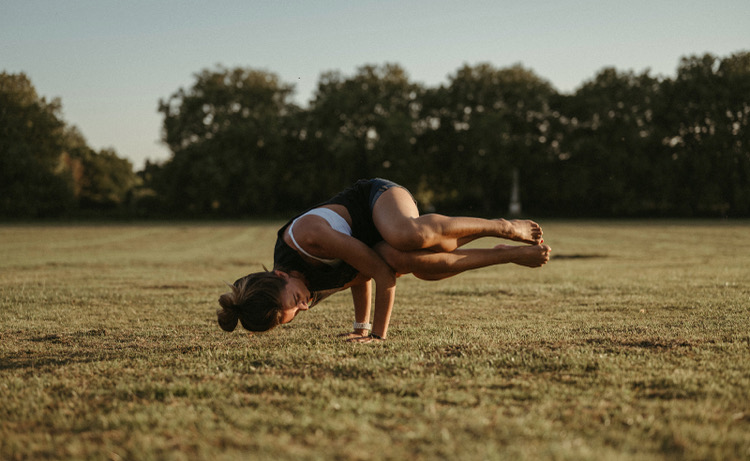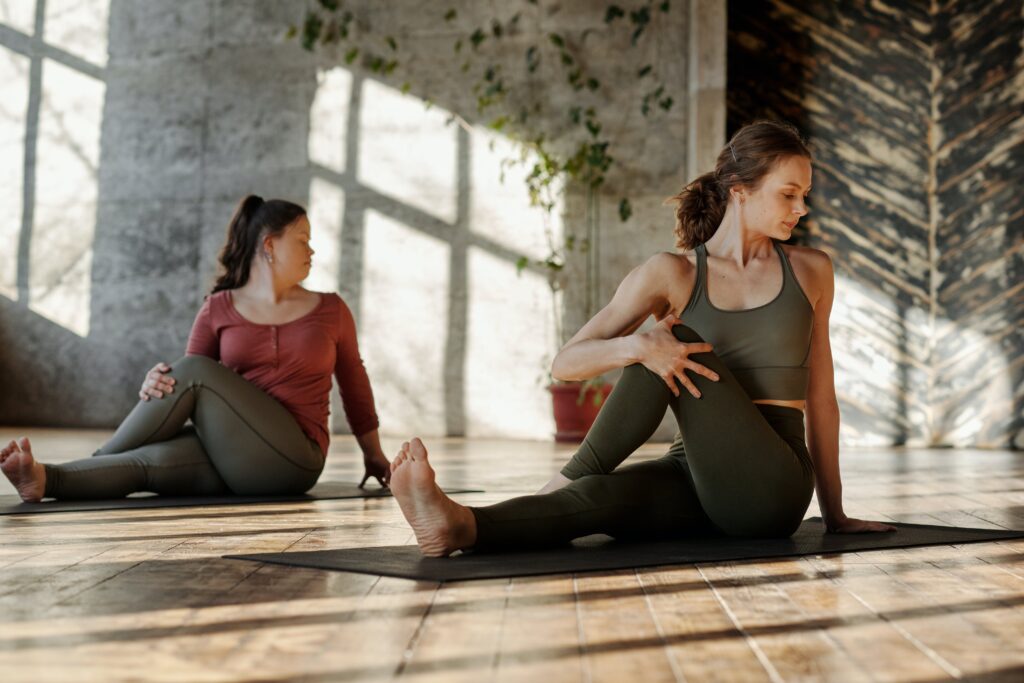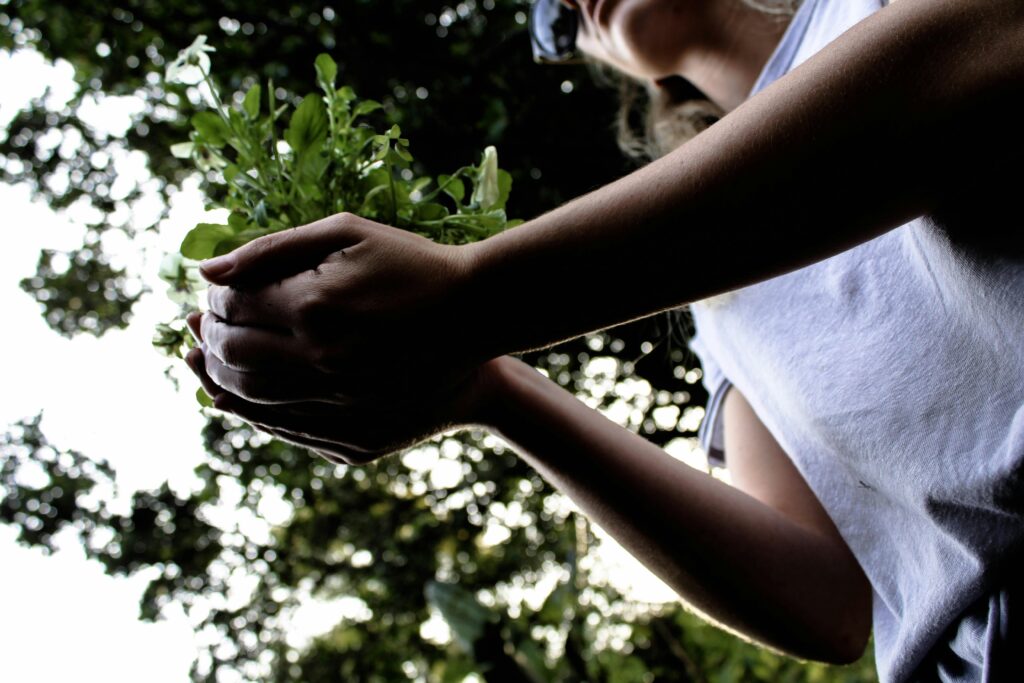
What is Yoga?
‘Yoga is the journey of the Self, through the Self, to the Self’ Bhagavad Gita.
Your Yoga, Your Journey
Yoga, in its entirety, is a holistic system that encompasses not just the body but also the mind, emotions, and spirit. It is a journey into self-awareness, a pilgrimage to the core of our being. While asana provides a gateway, it is merely a stepping stone on the path to a more profound understanding of ourselves.
How we show up on our mats is a reflection of how we show up in our every day lives. Are you in autopilot, rushing through your asana practice, waiting for what’s next or pushing to attain the more ‘advanced’ postures, or are you present, connected to your body, allowing your breath to guide you through?
How much can we enjoy the process of unfolding instead of pushing our bodies into shapes that it isn’t quite ready for. Yoga is more than just a physical practice. As we learn to tune inward, listening when our body speaks, moving with grace and compassion, we begin to understand ourselves on a much deeper level.
Find Comfort and Stability in the Pose
You may hear yoga teachers repeating the phrase ‘Sthira Sukham Asanam’. This means that the asana ‘posture’ can be perfected through finding a balance between effort and ease, of engagement and of softening. The pose should feel steady and comfortable in order to still the fluctuations within the mind. The means of perfecting the posture is that of relaxing, relenting effort, and allowing your awareness to merge with endlessness, the infinite.
Our asana practice though, is only a small portion of yoga but it is the practice that most people envision when they think of yoga. Asana is not about being as flexible as the person next to you, but about seeing what your physical body can do, and how we can better listen to it. When we do this, we can use the physical practice as an expression of steadiness and ease. Our asana practice is a vehicle for self enquiry-with wonderful benefits of getting stronger and (sometimes) bendier.
Emotional Exploration in Yoga
One of the keys to unlocking the transformative power of yoga lies in our ability to feel and explore our emotions during practice. Beyond the physical exertion, yoga offers a sacred space to connect with the full spectrum of our human emotions including joy, sadness, frustration, and bliss.
Ancient yogic philosophy acknowledges that emotions are energy in motion, thoughts stored in our body. When we suppress or ignore these energies, they can manifest as physical tension, mental unrest, or even disconnection from our authentic selves. When we allow ourselves to sit in an emotion, even an uncomfortable one, eventually it will pass. It did what it needed to do, you felt it and learned from whatever the emotion may have been, and it was able to be processed rather than be buried down only to resurface later.
A common, and very human response to unpleasant and uncomfortable feelings is to distract ourselves from them or try to ignore or compartmentalise them, burying them deep beneath the surface in an attempt to keep up with daily life. However, in order to heal you need to feel. And your yoga practice can be a safe place for self-exploration and to practise feeling all of your emotions, even the ones which you have deeply buried or denied.
By embracing our emotions both on and off the mat, we create an opportunity for healing and release. We can release stagnant energy, break free from emotional patterns, and ultimately cultivate a greater sense of inner peace and harmony.
The Wisdom of the Body-Mind Connection
Yoga teaches us that the body and mind are intricately connected, each influencing the other in a dance of energy and awareness. When we feel our emotions during practice, we tap into this profound body-mind connection, gaining insights into the sacred stories our bodies hold and the thoughts that shape our reality.
As a yoga teacher, I encourage my students to approach their practice with a sense of curiosity and openness. Rather than viewing emotions as disturbances, consider them as messengers, guiding you toward a deeper understanding of yourself.
The beauty of yoga lies not just in the elegance of a perfectly executed pose but in the authentic exploration of our inner landscape and the acceptance of how imperfectly perfect we are.
As we step onto our mats, let’s invite our emotions to join us, recognising them as valuable companions on our journey toward self-discovery and inner peace.
Your mat can be a sacred space where you feel, heal, and rediscover the profound wisdom that resides within. With this being said, we can realise that the secret of yoga isn’t in the deepest backbend nor in the perfect downward-facing dog. There’s no secret in the longest-held “Aum.”
The secret of yoga is in what you teach yourself through repeated visits to your mat. It’s the practise of uncovering the wisdom of your soul and through this journey of unravelling, unbecoming and unlearning, we find ourselves.
Here are a few lessons I have learned when I showed up and listened closely. I hope they can be useful to you also.
1. You Control Your Response
Your yoga practice is a time for you to observe and tune in to your body, to really listen to what it needs. Your teacher is guiding you through a sequence of poses and transitions but only you know how that feels in your body. You have the ability to be your own guide, to push further into any discomfort or to rest and to remember the power and wisdom that also resides in this rest.
Whether it feels like it or not, you have a say in how you react to discomfort. Every single time. It’s easy to attach to our struggles but Yoga shows us the power of our minds. We can learn to see hardship as an opportunity to celebrate strength.
Momentary discomforts and challenges on the yoga mat prepare you to respond with a more open heart to larger discomforts and challenges in your life off the mat.
Remember though that you have the choice of whether to lean in when it is uncomfortable or to back off and rest when you are called to.
2. Savour Small Adjustments.
I practiced yoga for years before I learned I should activate my thighs in Upward-facing Dog. This took the brunt of the move from my upper body and spread it more evenly from head-to-toe.
Years later, I learned to look slightly forward, rather than down, in Chaturanga. The shift in perspective lifted my shoulders and opened my heart — it infused the movement with an ease that had been patiently waiting for me to find it. I savoured my tiny victory.
Similarly, I’ve taken to celebrating the small wins in life. Often, it’s tackling the little challenges anxiety creates. Your small win might be pressing “submit,” or taking a breath instead of reacting. Whatever it is, it’s your win. Celebrate it.
These are the small adjustments that deepen the practice of living an empowered life. They are the simple, profound discoveries waiting for you to take notice.
3. Practice makes Progress
We are all masters of comparison. It feels natural. Yoga offers us a gentle lesson: We are all on our own journey and comparing ourselves to others only steals away from our focus and joy.
Being able to do all the poses the ‘right’ way isn’t important; showing up for your practice is. When you return to your mat over and over again, you start to discover what you’re meant to discover, what your soul is hungry to teach you and this is uniquely yours (and it probably won’t be about touching your toes).
Off the mat, you’ll make mistakes. You’ll care about something, and you’ll fail. Or someone else will do it better.
You’ll still care.
So, show up, again and again. You’ll grow towards your unique purpose if you allow it.
Focus inwardly on your own goals, your own wins. Keep practising.
4. It Is Safe to Open Your Heart
In yoga, backbends and heart-openers like Camel pose and Wheel pose require you to be entirely exposed, with your heart literally bared to the world. When you leave the pose your heart is racing. It’s a primal reaction.
You’ve allowed yourself to be vulnerable, and survived.
The world has a lot of sharp edges. It can be hard to trust. Turning inward and curling away from what might hurt you is a reasonable and human response. The problem is, protecting your heart from pain can also shield it from love and joy.
So, on the yoga mat, we practice. We open our hearts and leave our chests and necks exposed and unprotected and we live. We do it again, and we live some more.
Then, somewhere down the line, life asks us to take a chance on something meaningful and we can be ready for action. We can be afraid, but we act anyway.
Sometimes being vulnerable can hurt, but we’ll survive it. You’ll hurt either way but for reasons of regret if you don’t allow vulnerability. Showing up with an open heart is your only responsibility.
5. Your Best Effort Looks Different Every Day
Repeat after me: Sometimes I struggle… and that’s okay!
Some days you can’t touch your toes. Some days you can. Some days you’re perfectly balanced, made of natural grace. Other days your mind takes the wheel or you feel clunky and heavy.
Your yoga practice doesn’t look the same every day. It can’t. Because you’re a different person every time you step on your mat. You’ve experienced different aches. You’ve been nourished from different sources. There are so many different internal and external influences acting upon you.
With practice, you let go of what you think you should be capable of at any given moment.
You just show up. You practice.
Off the mat, some days you just need a break. This doesn’t cancel out all the time and energy you’ve so far ploughed into your practice. It doesn’t mean you’re failing. Learning to observe and also honour where your body is at, helps you be aware of, and gentle towards, the state of your soul. You learn to give yourself what you need without judgment. You learn to be a little kinder to you.
6. Through Everything, Breathe.
When we are able to be the master of our breath in difficult poses on our mat, we are better prepared to use our breath to help us navigate more challenging times and situations in life.
Your breath is your compass, your guide. Listen and connect to it.
If you’d like more information on all things yoga please contact me or book here to practise with me in Marlow, Twickenham and online.
With love
Anney xx




